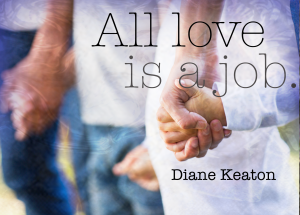Mothering Trauma
My Thoughts about Secure Attachment with our FIRST ADVOCATE-

The first advocate that we are hardwired to trust is a mother. Our ability to rebound from trauma is interwoven with the nurturing quality of our caregiver. This week I was reading about the ways we rebound from loss and I read this passage about vesseling. (in red and green below) I saw in Weller’s words a direct correlation to mothering. A mother is a holding space for our chaos as we face disequilibrium about learning how to make friends or speak a language. She is steady for us when we learn to stand up on our own. An adequate mother (vessel) builds hundreds of threads of attachment. These are trusted by a child and eventually the infant can stay emotionally regulated, even if he is separated from his mother for short periods of time.
THIS IS THE VESSELING IDEA
Vesseling is an idea that comes from alchemy. The old alchemists recognized that all deep work requires a holding space, a secure vessel within which the work is carried out. Vessels both contain and separate, allowing us to attend to the matter at hand. The container must be constructed slowly, however, over time, with attention, repetition, and care. If we place too much pressure on a weak container, it will shatter. We see the same thing happening in relationships that have failed or in projects we have abandoned. (page 148. The Wild Edge of Sorrow) by Francis Weller
Interview with a Stranger: When Being With A Parent Feels Like a Total Negation ---60 seconds
 I recently heard Meryl Streep recite a quote from Diane Keaton’s memoir. Keaton wrote, All love is a job… a great job, it’s the best job.”
I recently heard Meryl Streep recite a quote from Diane Keaton’s memoir. Keaton wrote, All love is a job… a great job, it’s the best job.”
Then Streep said this , “So I thank your mother because she brought us you.”
When I heard this I thought about the mothers that were elated to nurture and those that were afraid of intimacy or recoiling from their children. The lack of love when nurture is rejected is known intuitively by every child going through the incongruence of the relationship. This pain can be so harsh it takes your breath away even as you observe it. These are the mothers that cause their children to stand for hours at the display case for Mother’s Day cards because not a single card is fitting to their unique story.
We don’t like thinking that a percentage of mothers are like this. We deny they even exist. We hope that the number of mothers in the US with this malady is under ten percent. Surely it is. And yet, What if it isn’t? Mothers can be unfit and maladapted for the job of nurturing newborns as much as they can be unfit to enter the work force.
As I look over hundreds of stories I have heard over the decades, I think the crippling reasons for collapse for women that give birth are similar.
CAUSES
Addiction can make medicators or a “chemical romance” more important than a job or a child. Postpartum depression that becomes chronic depression after year one can take a mother out. Sexual addiction. Unfinished dreams. These can lure a woman to exit from the hard task of mothering. Abandoning a child, even one living under the same roof, produces guilt for the majority of mothers– but it isn’t motive enough to stop these hurting women ignoring the work of parenting.
And then, there’s always a handful of pesky examples of co-morbidity. Which looks like a blend of two things, such as, mental illness and medical illness. In these situations, two things are weighing down a mother and making it impossible for her to show up as an advocate in the day to day.
I am not saying this to lay blame at the feet of all mothers. We all have our weaknesses. But if you are listening to a friend and they speak of their parent never being able to leave the house for employment or make solid attempts at being an advocate for them, you may be in the vicinity of someone sharing a deep mother wound.
When you dissect the clip from Instagram above it is helpful to notice that Bill does not take a victim stance but he shares sentences that I consider deep trauma sentences.
_______________________________________________________________________
- It shakes your world.
- There is shock — most of the time you think of the family as a place of solace. Yet, he can’t count on his mother to have his back.
- There is emptiness and pain upon hearing the ugliest and meanest thing in the world. He says, “It felt like a total negation.”
These are all trauma responses. Often parenting neglect has a chronic quality and it will leave scars for one’s life span. Why? Because the armor we are meant to have as we leave childhood is this : A foundational trust in an advocate. We are hardwired to know in our body and soul that when we were helpless in size we actually were safe in the arms of our FIRST ADVOCATE– our mothers.
As you can see in the clip the only thing the speaker can do to be safe is to stop offering his mother access to his childlike vulnerability. She cursed his life by saying that “He was not worth her labor pains.” He countered her words by saying, “OK then, from this day forward, I am an adult and I will be guarded with you.”
He says, “It became an adult relationship after that . . . I had to keep a strong distance.”
When you advocate for someone going through the upside-down experience that I call a mother ache, keep listening to the shock and bewilderment. Keep looking for signs of adultification. Acting older than your years may have been a point of pride for your friend—-but is is sad that they grew up prematurely. Far out of sight, in the depths, living with mother hunger is difficult and worthy of seeking out a therapist. Living with neglect of mirroring and wise advocacy is a big departure from the way we were designed to live as human beings.
The Withdrawing Style Parent
—————————————————————————————————————————————
Moving Away from Others (Withdrawal):
In this orientation, the caregiver tends to detach themselves from their child and avoid emotional connections.
When they come near the child they may appear aloof, distant, and introverted. They prefer solitude and independence to the conflict and high stress of parenting. This withdrawal can be a defense mechanism to protect themselves from potential rejection or hurt. People with this orientation often prioritize self-sufficiency and emotional distance. They choose these in order to cope with their fears of intimacy and curb any reliance on others.